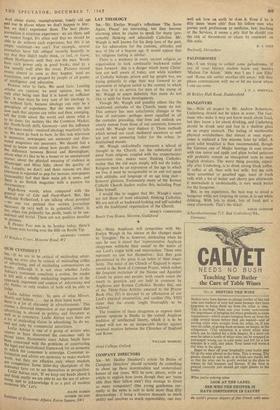SIR,—Many Anglicans will sympathise with Mr. Evelyn Waugh in his
unease at the changes made by 'liturgists.' He is, however, misleading when he says he sees it stated that 'representative Anglican clergymen withhold their assent' to the tenets of our Lord's virgin birth and resurrection. These men represent no one but themselves: that they gain prominence in the press is .an index of their singu- larity. The mind of the Church of England is repre- sented in the Book of Common Prayer, which orders the frequent recitation of the Nicene and Apostles' Creeds by priest and people; both creeds assert the tenets in question and are held in common by Anglicans and Roman Catholics. Besides this, one of the Thirty-Nine Articles annexed to the Prayer Book (No. IV) is devoted to an affirmation of our Lord's physical resurrection, and another (No. VIII) states that the creeds 'ought thoroughly to be believed.'
The freedom of these clergymen to express their private opinions is thanks to the valued Anglican tradition of intellectual liberty, which it is to be hoped will not be an insuperable barrier against eventual reunion between the Churches of England and Rome.
WILLIAM liORBURY Oriel College, Oxford






































 Previous page
Previous page